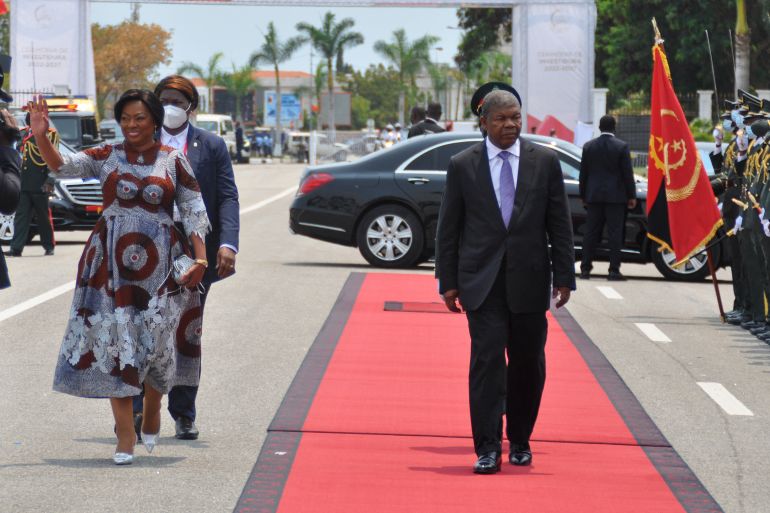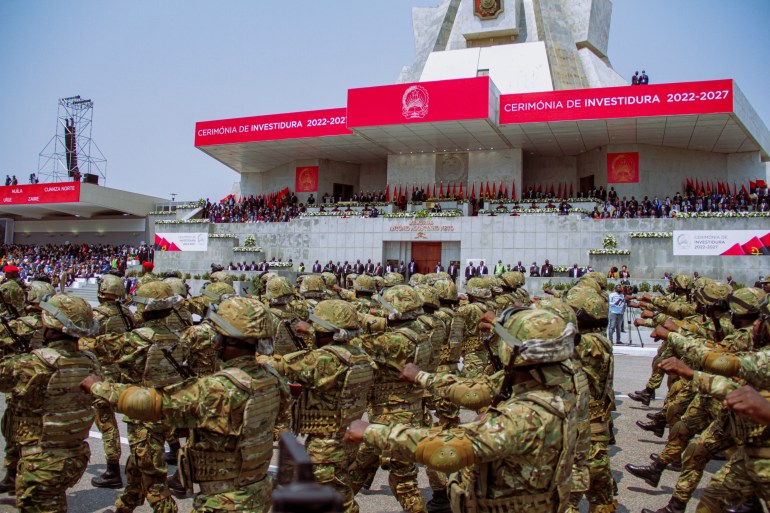Angola’s Lourenco pledges more economic reforms at swearing-in
President Lourenco, 68, returned to power after the August 24 vote gave the ruling party a thin majority in its worst performance since independence in 1975.

Angolan President Joao Lourenco has promised to push ahead with economic reform and hailed voters’ “tolerance” as he was sworn in for a second five-year term after a disputed electoral win last month.
Lourenco pledged to be “president for all Angolans” at a colourful ceremony held at the historic Praca da Republica square in the capital Luanda on Thursday amid tight security.
“Congratulations for the patriotism and high degree of tolerance, and civility shown in what are already considered the most disputed general elections in the history of the young Angolan democracy,” he said in his inauguration speech.
“Angolans have demonstrated to the world that at crucial moments, they know how to make the best choices and choose the future of their country with great responsibility.”
He said that by electing him and his party, Angola had chosen “continuity” and will be guaranteed “stability” as he pointed to further economic liberalisation in a country ruled since independence by a historically socialist party.
He promised to push ahead with reforms to encourage the private sector, expand the offer of goods and services and fight youth unemployment.
“We as a country have a clear option for democracy and a market economy.”
Security forces set up a heavy cordon around the venue, a move that the main opposition party, UNITA, said aimed to stifle dissent.
“This set-up aims to intimidate citizens who want to demonstrate against the election results on the day of the inauguration of a president without legitimacy,” UNITA, the National Union for the Total Independence of Angola, said in a statement.
Lourenco, 68, returned to power after the August 24 vote gave his People’s Movement for the Liberation of Angola (MPLA) a thin majority, winning just 51.17 percent of the votes.
The vote was to choose members of parliament, where the leader of the largest party automatically ascends to the presidency.
It was the MPLA’s poorest showing in the oil-rich African country it has controlled since independence from Portugal in 1975.
Lourenco also promised to increase wages, including for the armed forces – a pledge that received cheers from the crowd.
His new deputy, Esperanca Maria da Costa, 61, a college professor and biologist, was also sworn in, becoming Angola’s first female vice president.

Opposition protests
Opposition parties and civic groups say the vote was marred by irregularities.
UNITA , a former rebel movement that fought a bitter 27-year civil war against the MPLA government, made significant gains, earning 43.95 percent of the vote, up from 26.67 percent in 2017.
UNITA disputed the results in court but its appeal was tossed out.
Under its charismatic leader Adalberto Costa Junior, 60, UNITA has proved popular in urban areas and among young voters eager for economic change.
It did particularly well in the capital, where it won a majority for the first time. The MPLA instead lost its two-thirds parliamentary majority, with its seats dropping to 124 from 150.
‘Not much difference’
Foreign observers from other parts of Africa praised the peaceful conduct of the polls but raised concerns over press freedom and the accuracy of the electoral roll.
Lourenco, a former general, first came to power in 2017 when he took over from longtime ruler Jose Eduardo dos Santos, who bequeathed a country deep in recession and riddled by corruption and nepotism.
Lourenco swiftly turned on his predecessor, launching an anti-corruption campaign targeting his family and friends, which critics say was a political stunt.
He also embarked on an ambitious reform programme to lure foreign investors and diversify the economy.
But that has so far failed to brighten the prospects of many of Angola’s 33 million people who are mired in poverty.
In July, dos Santos died in Spain. State funerals for the late ruler were held in August.
Analysts see little change between the president and his predecessor.
“There is not much difference between two … in terms of respect for human rights and fundamental freedoms,” said Borges Nhamirre, a researcher at the Pretoria-based think-tank Institute for Security Studies.